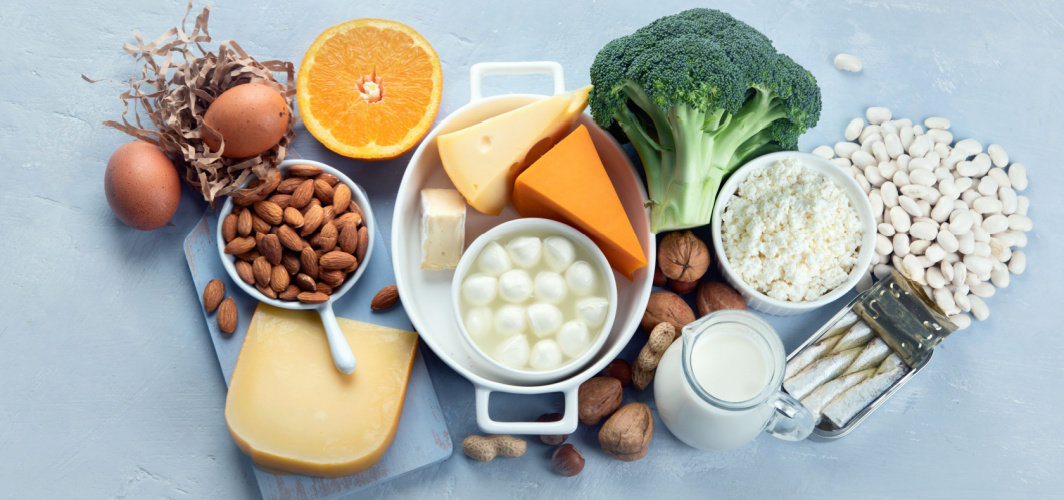- Home
- Blog
- General Health
10 Omega-3 Fatty Acids Foods For Improved Overall Health
General Health
10 Omega-3 Fatty Acids Foods For Improved Overall Health
By Apollo Pharmacy, Published on- 24 August 2023, Updated on -06 August 2024
Share this article
0
0 like

Omega-3 fatty acids are essential fats that play a crucial role in our overall health and well-being. In India, where the prevalence of heart diseases and mental health issues is increasing, it becomes even more important to understand the benefits of omega-3 fatty acids and incorporate them into our diet. Studies have reported that the omega-3 fatty acids intake in school-going children in India is less. Let's explore the top 10 sources of omega-3 fatty acid foods that we can easily include in our everyday meals.

What are Omega-3 Fatty Acids?
Omega-3 fatty acids are a type of polyunsaturated fat that is essential for the body's functioning. They come in different forms, including:
- EPA (eicosapentaenoic acid)
- DHA (docosahexaenoic acid)
- ALA (alpha-linolenic acid).
EPA and DHA are mainly found in fatty fish like salmon, mackerel, and sardines, while ALA is found in plant-based sources such as flaxseeds, chia seeds, and walnuts.
Health Benefits of Omega-3 Fatty Acids
Here are some key benefits of incorporating omega-3 fatty acids foods into your diet:
1. Lowering the Risk of Cardiovascular Diseases
Omega-3 fatty acids have been shown to reduce the risk of heart attacks and strokes by improving lipid profiles, reducing blood pressure, and preventing the formation of blood clots.
2. Supporting Brain Health and Cognitive Function
Omega-3 fatty acids play a crucial role in brain development and function. They have been linked to improved memory, focus, and overall cognitive performance.
3. Promoting Healthy Eye Function
DHA, one of the omega-3 fatty acids, is a major structural component of the retina. Consuming omega-3s can help maintain proper eye health and reduce the risk of age-related macular degeneration.
4. Reducing Inflammation and Supporting Joint Health
Omega-3 fatty acids have anti-inflammatory properties that can help reduce chronic inflammation, which is often associated with conditions like arthritis. Regular consumption of omega-3s may help alleviate joint pain and improve joint mobility.
5. Boosting Mood and Mental Well-being
Studies have found a positive correlation between omega-3 intake and mental health. Omega-3 fatty acids are believed to regulate neurotransmitters in the brain, helping to improve mood and reduce symptoms of depression and anxiety.
6. Enhancing Immune System Function
Omega-3 fatty acids play a vital role in maintaining a strong immune system. They help regulate immune cell function, reduce inflammation, and promote the production of anti-inflammatory molecules.
Top 10 Sources of Omega-3 Fatty Acids Foods
Here are the top 10 sources of omega-3 fatty acid foods that you can include in your meals:
1. Fatty Fish
Fish such as salmon, sardines, hilsa, rohu, and mackerel are excellent sources of omega-3 fatty acids. Include these fish in your diet at least twice a week to boost your omega-3 intake.
2. Flaxseeds and Flax Oil
Ground flaxseeds are a great plant-based source of omega-3s. Sprinkle them on yogurt, smoothies, or oatmeal for a nutty flavor and added nutrients. Flax oil can also be used in salad dressings or as a substitute for other oils in cooking.
3. Chia Seeds
Chia seeds are packed with omega-3 fatty acids and fiber. Add them to your breakfast cereal, blend them into smoothies, or make chia seed pudding for a nutritious snack.
4. Walnuts
Walnuts are not only tasty but also rich in omega-3 fatty acids. You can snack on a handful of walnuts or add them to salads, oatmeal, or baked goods.
5. Soybean
Soybean is a versatile legume that contains omega-3 fatty acids and can be used in various dishes like stir-fries, curries, and salads. Include soybean products like tofu or soy milk in your meals to increase your omega-3 intake.
6. Mustard Oil
Mustard oil is a unique source of omega-3 fatty acids suitable for vegetarians and vegans. Consider using it in cooking or as a salad dressing.
7. Spinach
Spinach is not only rich in iron but also contains omega-3 fatty acids. Use spinach as a base for salads, incorporate it into smoothies, soup, or saute it as a side dish to add omega-3s to your diet.
8. Cauliflower
Cauliflower is a nutritious vegetable that also contains omega-3 fatty acids. Steam or roast cauliflower florets as a side dish, use them in stir-fries or make cauliflower rice for a healthy omega-3 boost.
9. Rajma (Kidney Beans)
Rajma is a common ingredient in Indian cuisine and also contains omega-3 fatty acids. Include rajma in dishes like curries, salads, or wraps.
10. Olive Oil
Extra virgin olive oil is not only a healthy cooking option but also contains omega-3 fatty acids. Use it for sauteing vegetables or as a dressing for salads.
Recommended Serving Sizes and Recipes
1. Serving Sizes
- Fatty Fish: Two servings per week, each serving being around 100–150 grams.
- Flaxseeds: One tablespoon of ground flaxseeds daily.
- Chia seeds: One to two tablespoons of chia seeds daily.
- Walnuts: Around 30 grams or a handful of walnuts daily.
- Soybeans: Half a cup of cooked soybeans daily.
2. Sample Recipes
- Flaxseed and Walnut Smoothie: Blend one tablespoon of ground flaxseeds, a handful of walnuts, one banana, and a cup of almond milk for a nutritious and omega-3-rich smoothie.
- Salmon Curry with Flaxseed Chapatis: Cook salmon fillets in a flavourful curry sauce made with onions, tomatoes, and spices such as turmeric, cumin, and coriander. Serve it with whole wheat chapatis made with flaxseed powder mixed into the dough.
- Chia Seed Pudding with Soy Milk: Soak chia seeds in soy milk overnight, and in the morning, top it with fruits and nuts for a healthy and omega-3-packed breakfast.
- Walnut Ladoo: Make a healthy treat by blending walnuts, dates, and a pinch of cardamom powder. Shape the mixture into small balls to form a wholesome, guilt-free dessert enriched with omega-3 fatty acids.
Conclusion
In conclusion, Omega-3 fatty acids are essential for maintaining good health and well-being. Incorporating omega-3 fatty acids foods into your daily diet can provide numerous health benefits. Remember to prioritize a balanced diet that includes a variety of sources for optimal omega-3 intake to ensure improved health and well-being.
FAQs
Q. How much omega-3 fatty acids should I consume daily?
The recommended daily intake of omega-3 fatty acids varies depending on age and gender. Generally, adults should aim for 250–500 mg per day.
Q. Should I consider taking omega-3 supplements?
If you have trouble meeting your daily omega-3 needs through food alone, supplements can be beneficial. However, it's always best to consult with a healthcare professional before starting any new supplement regimen.
Q. Are there any risks associated with consuming too much omega-3 fatty acids?
While omega-3 fatty acids are generally safe to consume, excessive intake through supplements can increase the risk of bleeding in some individuals. It is important to follow recommended guidelines for consumption or consult a healthcare professional.
Q. Can children and pregnant women consume omega-3 fatty acids?
Yes, omega-3 fatty acids are crucial for child development and safe during pregnancy. However, consult a doctor for specific recommendations.
Q. Can cooking affect the omega-3 content in food?
Yes, excessive heat or prolonged cooking can degrade omega-3 fatty acids. Opt for gentle cooking methods like steaming or baking to retain maximum nutrients.
Services
General Health
Leave Comment
Services
Recommended for you
_9.jpg?tr=q-85)
General Health
My baby girl has a cough for the past 5-6 days. 4 days back a doctor 4 days gave cefpodoxime oral suspension IP but the condition has not improved. The doctor then gave a 5-day course of injection. traxol 250 mg. Please guide what to do.

General Health
Top 12 Calcium-Rich Foods For Stronger Bones & Improved Health
This article offers details about the significance of calcium for strong bones and general good health. It provides a list of 12 calcium-rich foods, daily calcium needs for various age groups, warning signs of calcium deficiency, and possible side effects of consuming too much calcium.

General Health
How To Increase Hemoglobin? Know 6 Ways To Improve Your Levels
This blog highlights the significance of hemoglobin in the body and provides effective strategies to increase hemoglobin levels naturally. It explains the role of hemoglobin in oxygen transportation, carbon dioxide removal, and pH regulation. It also discusses the symptoms and causes of low hemoglobin levels and suggests dietary changes to boost hemoglobin.
Subscribe
Sign up for our free Health Library Daily Newsletter
Get doctor-approved health tips, news, and more.

